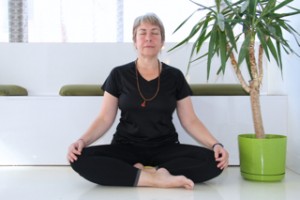Move and Meditate with Angad (Part 1)
Looking to incorporate meditation into your practice? Join Angad on Sunday evenings at our Bay and Dundas location for a new class called “Move and Meditate”. Angad has maintained a daily yoga and meditation practice since 1997, and has been teaching and helping people transform their lives since 1999. The class begins with tuning in, followed by a few yoga postures to warm up, then a short meditation (3 to 11 minutes), and a relaxation. A variety of meditations will be taught so students experience healing, changing old or unwanted habits, letting go of negative thoughts and memories, replacing reactivity with positive action, and shifting into neutral. Below, Angad has offered some answers to common questions about meditation!
How can I gauge progress in meditation?
This is an interesting question and a good one to start with because meditation is a means, not an end. It’s a technology and a practice that leads to an expanded awareness, stronger nerves, improved concentration, greater clarity and focus, and more control over one’s mind. And the only way to get those results is repetition. The more you practice, the more familiar you are with the experience and application of the techniques. Then this brings new awareness and options to how you choose to think, understand, act, relate and communicate in your daily life. Think of running, when you first start running, it’s new, so it’s going to take time to build up strength, endurance, lung capacity, mental strength and awareness, and proper technique. One starts slowly, shorter distances, does some research to get the proper shoes and gear and to find appropriate routes, as well as getting advice and coaching from a mentor or experienced runner. After awhile, you know what your body feels like at 1 km, at 3 km, at 5km, you recognize the change in your breath, the feeling in muscles of your legs, where you are or aren’t holding tension in your shoulders or back, the length of your stride, how to handle hills, etc. The only way to gain this awareness is to practice and pay attention, and then you probably notice over time, that perhaps you have more energy during the day, that your appetite is healthy, that your metabolism has improved, your lung capacity has increased, etc. It’s the same with meditation, as you practice, and gradually increase the time you meditate, you are more aware of your inner experience, your body, your breath, your heartbeat, your mind, your thought patterns, how you resist or react, how you adjust. You also gain new experiences, by going through a challenge, by adjusting and persisting through resistance and distraction, you discover new ways of knowing, thinking and being. You bring this new awareness, what you learn from your meditative experience to your daily life, and you notice that you are less reactive and emotional, and more aware, intuitive, proactive, calm, and compassionate. You will find yourself finding a third option when there previously seemed to be only two choices. You will discover a new way of understanding another person’s perspective and a new way to connect when you used to react emotionally and repeat an old pattern. You will find yourself staying calm and clear when there is pressure or a challenge, and finding a solution and a way through. These are the results your experience with meditation over time.
How long does it take to see the benefits of meditation?
Meditation has very specific effects at different times. For example, in terms of time, at three minutes of meditation, your blood and circulation are affected. After eleven minutes you are strengthening your nerves and activating your pituitary gland. At 31 minutes, your negative, positive and neutral or meditative aspects of your mind are affected, as well as your electro magnetic field and the body’s internal elements (earth, water, fire, air, and ether).
In terms of repetition, it takes 40 day of daily meditation to change a habit. It takes 90 days to create a new habit. It takes 120 days to integrate the habit into who you are. It takes 1,000 days (or about three years) to master the new habit.
That said, a person can feel the positive effects of meditation after one class or a few classes because they can call on that experience, what they learned and observed, to apply to daily life situations. The more you practice, the greater the awareness, the more practiced you are with self control, and the easier and more familiar it becomes to see and make decisions, using your neutral or meditative mind.
How long should a session last for a beginner?
A meditation session is most effective, if you first tune in using a focal point, breath and a mantra and then do some warm up Yoga exercises to bring your awareness inward and increase the circulation of your energy. Then, depending on the meditation, 3 to 11 minutes is good for a beginner. Repetition is the key to successful meditation, and one can gradually increase time over a few weeks and months.



